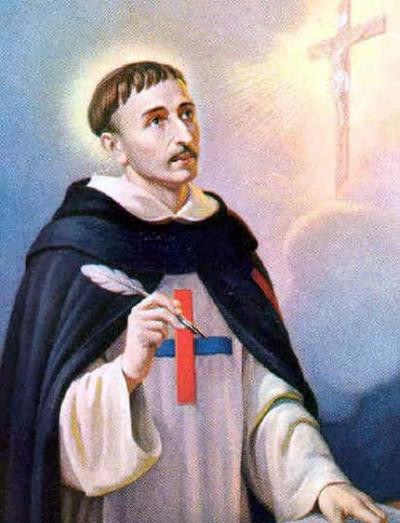
Saint of the Day December 17: St. John de Matha
St. John de Matha: Founder of the Order of the Holy Trinity and His Mission of Redemption
Name
St. John de Matha
Title
Priest
Birth
June 23, 1154, Faucon, France
Death
December 15, 1213, Rome
Recurrence
17 December
Canonization
October 21, 1666, Rome, Pope Alexander VII
Prayer
Glorious St. John de Matha, you who, inflamed with great love for God and tender compassion for your neighbor, were by God Himself chosen to found the honored Order of the Most Holy Trinity, and spent your days in glorifying this august Mystery and in redeeming the wretched Christian slaves deh! Obtain for us the grace that we too may spend our lives glorifying the Most Holy Trinity and benefiting our neighbor with the works of Christian charity, that we may then have the good fortune of enjoying in Heaven the beatific vision of the Father, the Son and the Holy Spirit. So be it.
Roman Martyrology
In Rome on Mount Caelian, St. John de Matha, a priest, who, French by origin, established the Order of the Holy Trinity for the liberation of slaves.
The Saint and Mission
St. John de Matha, founder of the Order of the Holy Trinity in the 12th century, is a prominent figure in Church history for his unique and compassionate mission. His life and works exemplarily embody the Christian mission to serve and liberate those who are oppressed and imprisoned.
St. John de Matha’s mission was inspired by a divine vision during his first Mass. In this vision, he was called to dedicate his life to the liberation of Christian prisoners held by Muslims. This experience radically transformed his life, prompting him to found the Order of Trinitarians, with the specific purpose of ransoming prisoners of war and enslaved Christians.
His approach to mission was characterized by direct and concrete action. St. John de Matha and his followers worked tirelessly to raise funds, negotiate with jailers and organize the ransom of prisoners. This work of mercy went far beyond material assistance; it represented a deep commitment to human dignity and freedom, central values of the Gospel.
Moreover, St. John’s mission was rooted in a deep Trinitarian spirituality. He saw his work of liberating prisoners as a participation in the love and mercy of the Holy Trinity. This theological vision provided a solid spiritual and moral basis for his mission and inspired his followers to see their service as an extension of God’s love for humanity.
St. John de Matha not only freed prisoners, but also ensured that they had the resources they needed to reintegrate into society. This focus on the long-term well-being of the redeemed shows that his mission was guided by a deep sense of responsibility and compassion.
The life of St. John de Matha reminds us that Christian mission goes beyond the verbal proclamation of faith. It is an active engagement in the world, characterized by concrete actions of justice, liberation and love. His legacy continues to inspire Christians to live the Gospel actively, serving others in ways that reflect God’s love and mercy.
The Saint and Mercy
St. John de Matha is an emblematic figure in the expression of Christian mercy. Living in the 12th century, his life and ministry are deeply rooted in the concept of mercy, as evidenced by his involvement in the redemption of Christian prisoners.
Mercy in St. John de Matha is initially manifested in his choice of life. After completing his studies in theology, he received a vision during his first mass, which inspired him to dedicate his life to the liberation of Christian prisoners held by Muslims. This moment of divine enlightenment was the catalyst for a life mission dedicated to mercy and service to others.
His most significant work was the founding of the Order of the Holy Trinity, also known as the Order of the Trinitarians. This religious order had a specific goal: to raise funds and negotiate the release of Christian prisoners. St. John de Matha’s approach reflected a deep understanding of mercy as practical action. He did not just pray for prisoners or offer spiritual comfort, but actively acted to secure their physical release.
Moreover, his dedication to Christian prisoners went beyond the simple act of freeing them; it also included their reintegration into society. This aspect of his mission shows that mercy is a holistic process that involves not only physical rescue but also subsequent support and care.
The life of St. John de Matha teaches us that mercy is a powerful force that can transform lives. His example encourages us to look beyond our personal needs and concerns and respond with concrete action to the suffering of the world. His legacy is an invitation to live mercy actively, seeking practical ways to alleviate the pain and suffering around us.
Hagiography
He is the founder of the Order of Trinitarians for the redemption of slaves.
He was born in Falcone in Provence on the year 1154 to parents rich in census and virtue. Educated with every care, he soon showed such gifts of wit, seriousness and a heart so sensitive to the miseries of others that the future consoling angel of the afflicted was foreshadowed in him. At the behest of his parents he attended school in Aix, then sent to the Academy in Paris, where he brilliantly obtained the degree of Doctor of Theology.
His piety, not inferior to science, so impressed the Archbishop of Paris that he decided to urge him to become a priest. The only obstacle was the humility of the young graduate, but it was not difficult for the Prelate to dissolve his doubts and…
